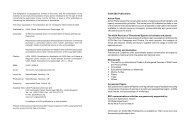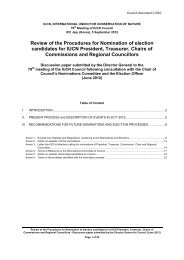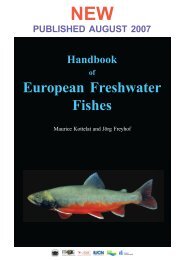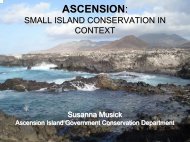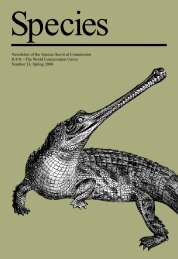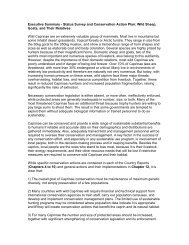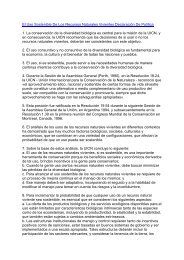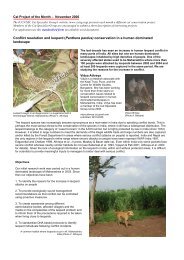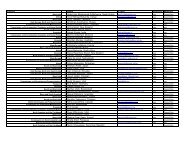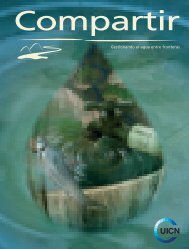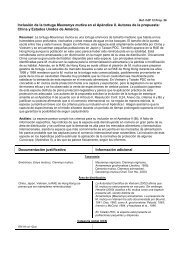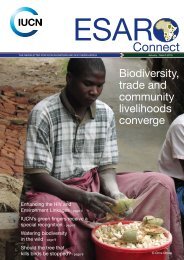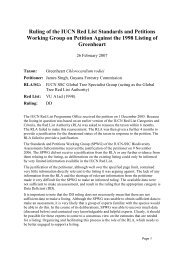Planning education to care for the earth - IUCN Knowledge Network
Planning education to care for the earth - IUCN Knowledge Network
Planning education to care for the earth - IUCN Knowledge Network
You also want an ePaper? Increase the reach of your titles
YUMPU automatically turns print PDFs into web optimized ePapers that Google loves.
<strong>Planning</strong> <strong>education</strong> <strong>to</strong> <strong>care</strong> <strong>for</strong> <strong>the</strong> <strong>earth</strong>Fundación Natura does not engage in tasks which are <strong>the</strong> naturalresponsibility of o<strong>the</strong>r institutions, but it does motivate work whichcontributes <strong>to</strong> <strong>the</strong> solution of environmental problems it has identified.Any cooperation with o<strong>the</strong>r organizations must imply a minimum of sharedwork so that experience, knowledge, and work methods can be exchanged.Only <strong>education</strong>al activities with an identified need <strong>for</strong> a technical team from<strong>the</strong> foundation are accepted.The general operating plan <strong>for</strong> Fundación Natura incorporating a budget <strong>to</strong>present <strong>to</strong> financial sponsors covers <strong>the</strong> <strong>to</strong>tal period of projects orprogrammes (four <strong>to</strong> five years in <strong>the</strong> case of EDUNAT). The foundationsubsequently draws up an operating plan <strong>for</strong> <strong>the</strong> fiscal year and this serves as<strong>the</strong> basis <strong>for</strong> quarterly plans and <strong>the</strong> weekly work plans <strong>for</strong> individual staffmembers. Progress reports are issued quarterly and annually. This approachmakes it possible <strong>to</strong> apply modular planning which is adjusted <strong>to</strong> <strong>the</strong>availability of resources and <strong>the</strong> priorities of <strong>the</strong> donor institutions. EEprojects must be evaluated by an outside team.EDUNAT paid no more than 25 percent of publicity and advertising in <strong>the</strong>mass media; <strong>the</strong> remainder had <strong>to</strong> be covered by <strong>the</strong> media or by cosponsors.No cash was donated <strong>to</strong> any institution <strong>for</strong> <strong>education</strong>al activities,but cooperative operations were financed.Production of <strong>education</strong> and communication materials was decentralized,with at least 75 percent of <strong>to</strong>tal production stemming from local initiatives;50 percent of material reproduced allowed <strong>for</strong> local trial and adaptation. All<strong>education</strong>al materials were tested <strong>to</strong> ensure that <strong>the</strong>y met <strong>the</strong> needs of <strong>the</strong>audiences addressed.In local communities, EDUNAT did not engage in mass <strong>education</strong> activities,which were left <strong>to</strong> o<strong>the</strong>r institutions. In exceptional cases of ecologicalemergency or <strong>to</strong> test new materials over short periods, EDUNAT did,however, work directly in such communities.The staff of EDUNAT were on temporary contracts in line with a policy ofefficiency and austerity; as each phase ended, technical/administrative teamswere disbanded. Education/communication strategies were designed <strong>for</strong>different target audiences.Specific approachesIn <strong>the</strong> first stage of EDUNAT, a “shock strategy” was used with key figuresin government, chambers of commerce and various professionalorganizations. Audio-visual slide sets were presented privately <strong>to</strong> <strong>the</strong>seindividuals at <strong>the</strong>ir places of work <strong>to</strong> demonstrate <strong>the</strong> environmentalproblems, <strong>the</strong>ir causes, social fac<strong>to</strong>rs, and alternative solutions. One set(eight minutes) described <strong>the</strong> main environmental problems in <strong>the</strong> world ingeneral and in Ecuador in particular. Five o<strong>the</strong>r sets (five minutes each)concentrated on subjects of interest <strong>to</strong> particular categories:• <strong>the</strong> role of political leaders;158



